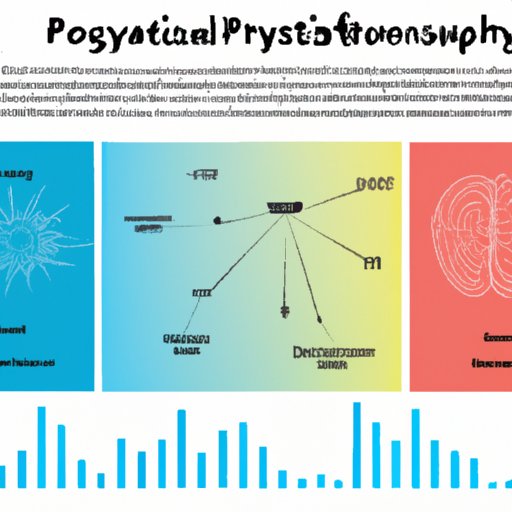Introduction
Psychology is a field of study that focuses on understanding behavior and mental processes. It is an academic discipline that seeks to explain why people think, feel, and act the way they do. While it is often referred to as a “soft science,” psychology is a legitimate scientific field that employs the scientific method to collect and analyze data.
Examining the Scientific Methodology Used in Psychology
The scientific method is a set of steps used to investigate a phenomenon and draw conclusions based on the evidence gathered. In psychology, the scientific method is used to design experiments, collect data, analyze results, and draw conclusions. The steps of the scientific method include making observations, formulating hypotheses, testing hypotheses through experimentation, analyzing results, and drawing conclusions.
For example, Stanley Milgram conducted a famous experiment in 1963 to study obedience to authority figures. He made observations about the behavior of people in relation to authority figures, formulated a hypothesis about the effects of authority on behavior, tested his hypothesis through an experiment, analyzed the results, and drew the conclusion that people are more likely to obey authority figures than disobey them.

Exploring the Different Areas of Psychological Research
Psychology is composed of several subfields, each of which focuses on a different aspect of human behavior and mental processes. These subfields include biological psychology, cognitive psychology, developmental psychology, social psychology, personality psychology, and clinical psychology. Each field contributes to the overall understanding of human behavior by providing insight into different aspects of the mind and body.
For instance, biological psychology focuses on the physical and biochemical processes that underlie behavior. Cognitive psychology is concerned with how people think, remember, and learn. Developmental psychology looks at how behavior changes over time. Social psychology examines the influence of social contexts on behavior. Personality psychology investigates individual differences in behavior. And clinical psychology focuses on diagnosing and treating mental health issues.

Analyzing the Role of Data and Statistics in Psychology
Data and statistics play a crucial role in psychological research. In order to understand human behavior and mental processes, researchers must collect data from participants and analyze it using various statistical techniques. This data can come from a variety of sources, such as surveys, interviews, laboratory experiments, and naturalistic observations.
Once the data has been collected, researchers use statistical methods to analyze it. These methods include descriptive statistics, correlational analysis, and inferential statistics. Descriptive statistics provide information about the characteristics of a sample. Correlational analysis is used to identify relationships between variables. And inferential statistics allow researchers to make generalizations about a population based on a sample.
Discussing the Relationship between Psychology and Neuroscience
Psychology and neuroscience share an interdisciplinary relationship. Neuroscience is the study of the nervous system and its effects on behavior, while psychology is the study of behavior and mental processes. Advances in neuroscience have led to new insights into the biological basis of behavior, and this has informed psychological research.
For example, research in neuroscience has shed light on the neural mechanisms underlying emotion regulation. This has allowed psychologists to develop more effective treatments for mental health disorders related to emotional dysregulation, such as depression and anxiety.
Investigating the Influence of Culture on Psychological Theories
Culture plays an important role in shaping psychological theories. Cultural norms and values can influence the way people think and behave, which can in turn affect the development of psychological theories. For instance, research on cross-cultural differences in social behavior has led to the development of theories that take into account the influence of culture on behavior.
According to psychologist Robert LeVine, “One cannot understand the behavior of any individual without considering the culture in which the individual is embedded.” This underscores the importance of accounting for the influence of culture when developing psychological theories.

Looking at the Impact of Psychology on Society
Psychology has had a significant impact on society. Psychological knowledge has been used to address social issues, such as poverty and discrimination. It has also been used to improve educational practices and promote positive health behaviors. In addition, psychological research has helped to reduce crime and increase public safety.
For instance, studies have found that interventions aimed at reducing recidivism among offenders have been successful in decreasing crime rates. Similarly, research on the effects of bullying has led to greater awareness of the issue and the development of strategies for preventing it.
Conclusion
In conclusion, psychology is a legitimate scientific field that employs the scientific method to collect and analyze data. Its various subfields contribute to the overall understanding of human behavior and mental processes, and advances in neuroscience have informed psychological research. Furthermore, cultural influences and statistical methods play an important role in psychological research, and psychological knowledge has been used to address social issues. All of these factors demonstrate why psychology is considered a science.
(Note: Is this article not meeting your expectations? Do you have knowledge or insights to share? Unlock new opportunities and expand your reach by joining our authors team. Click Registration to join us and share your expertise with our readers.)
